人教高中英语必修4 Women of achievement Using Language(共20张PPT)
文档属性
| 名称 | 人教高中英语必修4 Women of achievement Using Language(共20张PPT) |  | |
| 格式 | zip | ||
| 文件大小 | 231.0KB | ||
| 资源类型 | 教案 | ||
| 版本资源 | 人教版(新课程标准) | ||
| 科目 | 英语 | ||
| 更新时间 | 2020-05-12 20:41:21 | ||
图片预览

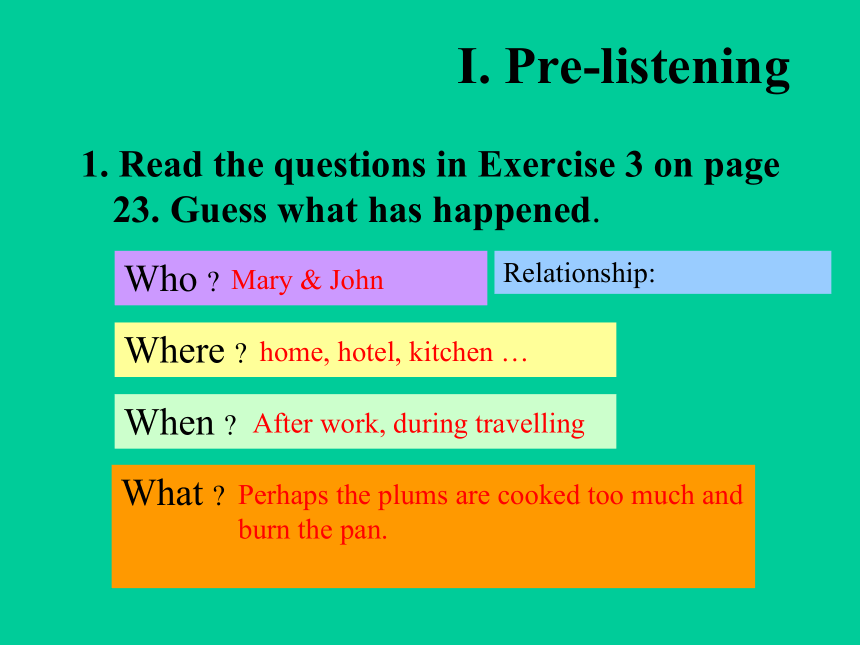
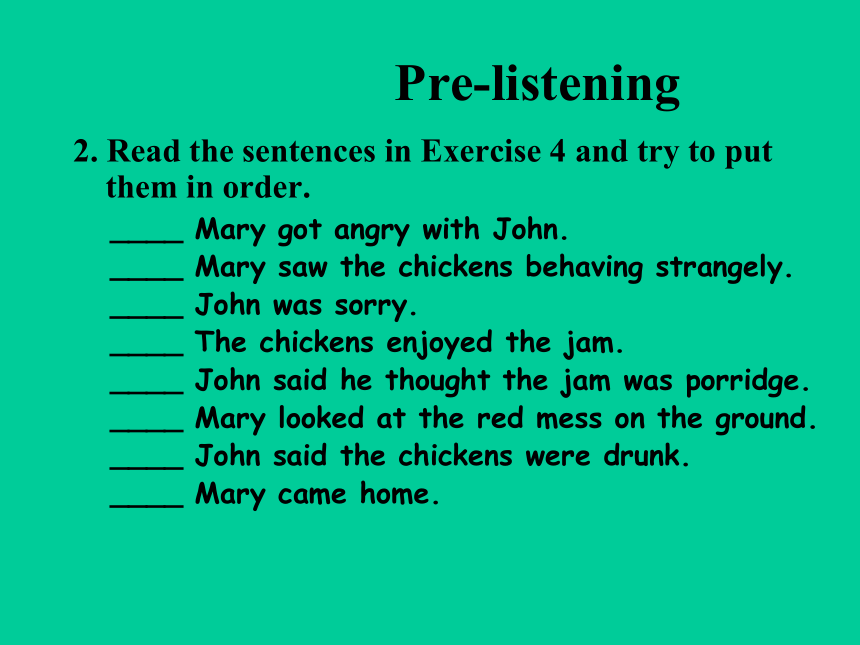
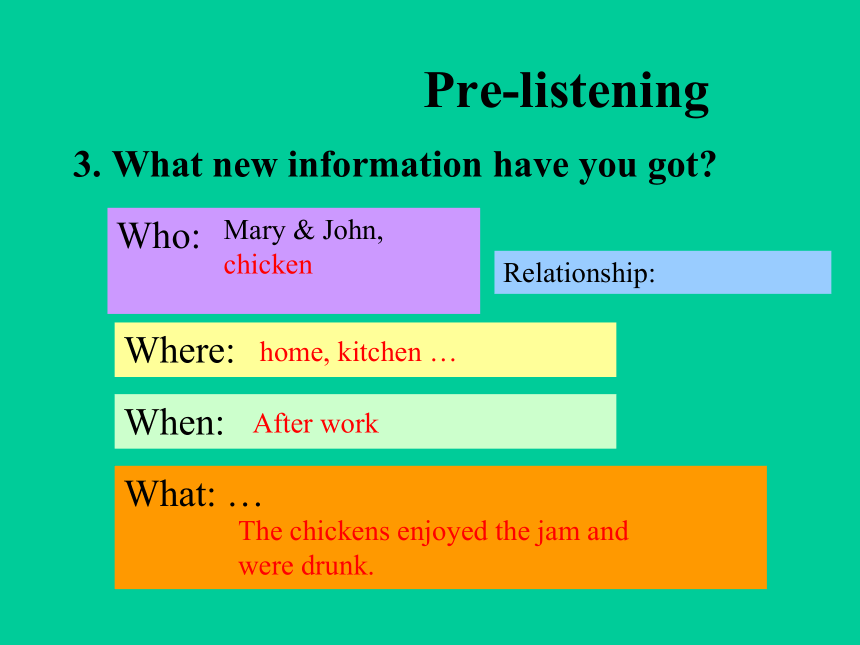


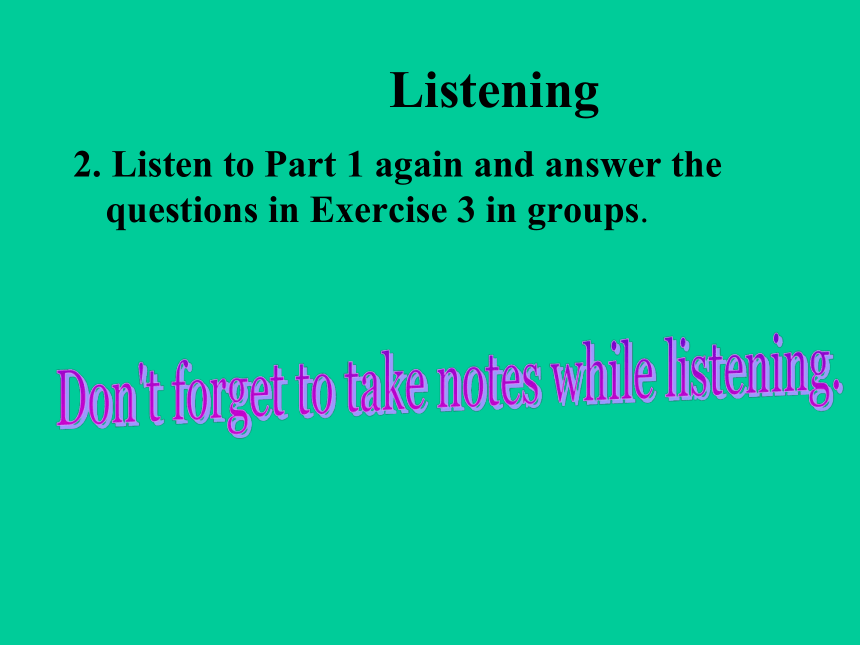
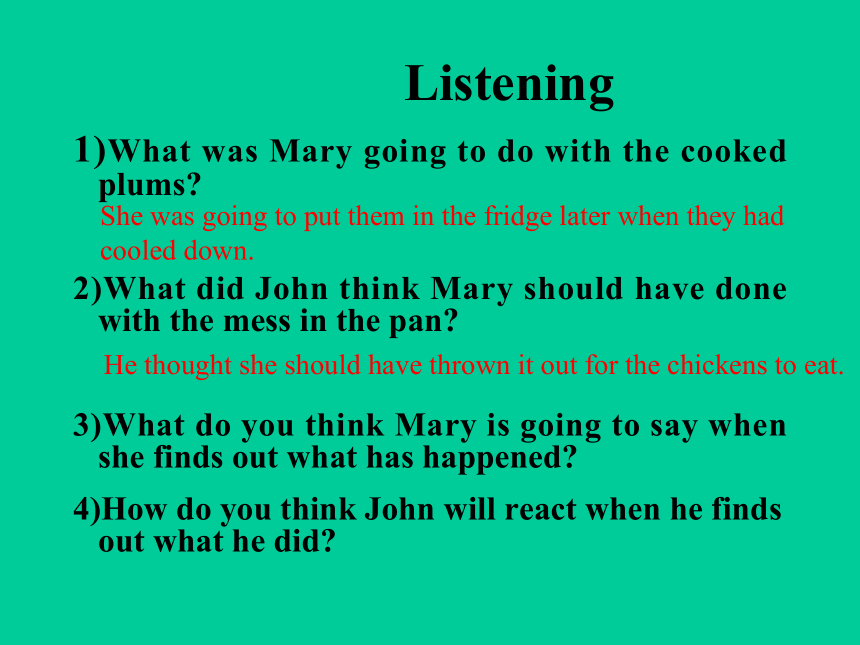

文档简介
(共20张PPT)
Unit 3 A taste of English humour
Using Language Ⅱ
I. Pre-listening
1. Read the questions in Exercise 3 on page 23. Guess what has happened.
Who ?
Where ?
What ?
When ?
Relationship:
Mary & John
home, hotel, kitchen …
After work, during travelling
Perhaps the plums are cooked too much and burn the pan.
Pre-listening
2. Read the sentences in Exercise 4 and try to put them in order.
____ Mary got angry with John.
____ Mary saw the chickens behaving strangely.
____ John was sorry.
____ The chickens enjoyed the jam.
____ John said he thought the jam was porridge.
____ Mary looked at the red mess on the ground.
____ John said the chickens were drunk.
____ Mary came home.
Pre-listening
3. What new information have you got?
Who:
Where:
What: …
When:
Relationship:
home, kitchen …
After work
Mary & John, chicken
The chickens enjoyed the jam and were drunk.
Pre-listening
4. Read the following sentences and work out their meanings. Which meaning is used in the listening?
Sentences Meaning
1 When I got home, the house
was in a complete mess.
2 All she could do was to hope
that she could sort out the mess. A untidiness
B problem
3 He reacted angrily to the stories
people had made up about him.
4 Quite a lot of children react badly to
shellfish. C become ill from eating particular
food
D behave in a certain way
II. Listening
Listen to Part 1 and fill in the blanks.
Mary made some _____ but left some on the ____________ for a few days as she had to go to _________ her sick mother. Some days later, John, knowing ________ about the jam, came home and _______ it into the _______ yard.
Main idea
jam
kitchen table
look after
nothing
threw
chicken
Listening
2. Listen to Part 1 again and answer the questions in Exercise 3 in groups.
Listening
1)What was Mary going to do with the cooked plums?
2)What did John think Mary should have done with the mess in the pan?
3)What do you think Mary is going to say when she finds out what has happened?
4)How do you think John will react when he finds out what he did?
She was going to put them in the fridge later when they had cooled down.
He thought she should have thrown it out for the chickens to eat.
Listening
Mary’s reaction John’s reaction
1 laugh 1 apologise.
2 tell her she should not have left the
jam on the kitchen table.
2 get angry and tell John he
should have put the jam in the
dustbin. 1 get angry too and say that she should have
told him she was making jam.
2 laugh and say it is not important.
3 apologise.
3 say that the problems with
the chickens are John’s
responsibility.
1 deny this saying that she should not have
left the jam on the kitchen table.
2 say that Mary did not tell him what she
had been doing in the kitchen.
3 did not know the chickens would get sick.
4
2
5
7
6
3
8
1
Listening
3. Listen to Part 2 and check if you have put the
sentences in Exercise 4 right.
Listening
4. Listen to Part 2 again and fill in the blanks.
“You __________ my jam,” she shouted. “Oh, ______ what it was,” he said. “I’m _____ but I thought it was _______ which had gone bad in the hot weather. The chickens have ________ the jam, but it’s made them ________.
threw away
that’s
sorry
porridge
enjoyed
drunk
III. Listening (Workbook)
Read the exercises on page 55 and try to predict the listening.
who:
where:
when:
what:
Peter, his wife, a thief
midnight
A thief wanted to steal the potatoes from Peter and his wife, but he failed.
Listening (Workbook)
2. Listen to the tape and tick the words you hear.
thief knife potatoes midnight shirt
spread stole whispered shouted
Write down the main idea in one sentence.
The story is about a thief who tries to steal some potatoes and Peter who successfully prevents them from being stolen.
Is your prediction right?
Listening (Workbook)
3. Listen to the story again and answer the questions in Exercise 3 in your own words.
1) Where did Peter get the potatoes?
2) Why did he ask his wife to be quiet when she heard the thief?
3) Why couldn’t the thief take away the potatoes?
4) Why was the thief angry?
He thought the thief might have a knife and he did not want to make him angry.
Peter was given the potatoes by a friend.
Peter removed the shirt that the thief had planned to put the potatoes in.
He thought the husband had stolen his shirt so he could no longer steal the potatoes.
Listening (Workbook)
4. In pairs discuss what you think will happen next. Write down your ending.
Listening (Workbook)
Sample
1. Peter will leap out of bed and grab the thief. Then he’ll
take him to the police station and the thief will go to
prison.
2. Peter’s wife will become very angry with Peter because
she was right. While she and Peter are arguing the thief
will take the potatoes and leave the house.
IV. Talking
1. Work in groups and discuss about the stories you have just heard.
Did you think it was funny? Why?
Who do you think is funny? Why?
Talking
2. Study the following expressions.
I enjoyed the story because …
How enjoyable that was!
It is very amusing/funny that …
I find it extremely funny that …
It surprises me that …
I can’t help laughing when …
I burst into laughter when …
I laughed till my sides split when …
I’ve never laughed so much as when …
I don’t like the story at all.
I don’t think that’s funny at all.
What’s so funny about that?
I can’t understand why you laughed at that.
Talking
S1: What do you find funny? I enjoy watching Mr Bean because he makes such wonderful faces as he does stupid things.
S2: I’m not surprised you like Mr Bean, because all my family are crazy about him and cannot get enough of his programmes.
S1: We enjoy this kind of humour because my father loves Charlie Chaplin films. When he sees his stick and hat and that funny walk, he always bursts into laughter.
S2: What I like best is the problems Mr Bean has with everyday situations ? like changing his clothes on the beach. I laughed till my sides split when I was watching it.
S1: Yes, I know that one. It reminded me when I stayed in England and I watched everybody try to change into their swimming costume, under a towel. It’s good that we both enjoyed that!
V. Homework
Collect as many funny stories as possible, do some preparations for the writing in the next period.
Unit 3 A taste of English humour
Using Language Ⅱ
I. Pre-listening
1. Read the questions in Exercise 3 on page 23. Guess what has happened.
Who ?
Where ?
What ?
When ?
Relationship:
Mary & John
home, hotel, kitchen …
After work, during travelling
Perhaps the plums are cooked too much and burn the pan.
Pre-listening
2. Read the sentences in Exercise 4 and try to put them in order.
____ Mary got angry with John.
____ Mary saw the chickens behaving strangely.
____ John was sorry.
____ The chickens enjoyed the jam.
____ John said he thought the jam was porridge.
____ Mary looked at the red mess on the ground.
____ John said the chickens were drunk.
____ Mary came home.
Pre-listening
3. What new information have you got?
Who:
Where:
What: …
When:
Relationship:
home, kitchen …
After work
Mary & John, chicken
The chickens enjoyed the jam and were drunk.
Pre-listening
4. Read the following sentences and work out their meanings. Which meaning is used in the listening?
Sentences Meaning
1 When I got home, the house
was in a complete mess.
2 All she could do was to hope
that she could sort out the mess. A untidiness
B problem
3 He reacted angrily to the stories
people had made up about him.
4 Quite a lot of children react badly to
shellfish. C become ill from eating particular
food
D behave in a certain way
II. Listening
Listen to Part 1 and fill in the blanks.
Mary made some _____ but left some on the ____________ for a few days as she had to go to _________ her sick mother. Some days later, John, knowing ________ about the jam, came home and _______ it into the _______ yard.
Main idea
jam
kitchen table
look after
nothing
threw
chicken
Listening
2. Listen to Part 1 again and answer the questions in Exercise 3 in groups.
Listening
1)What was Mary going to do with the cooked plums?
2)What did John think Mary should have done with the mess in the pan?
3)What do you think Mary is going to say when she finds out what has happened?
4)How do you think John will react when he finds out what he did?
She was going to put them in the fridge later when they had cooled down.
He thought she should have thrown it out for the chickens to eat.
Listening
Mary’s reaction John’s reaction
1 laugh 1 apologise.
2 tell her she should not have left the
jam on the kitchen table.
2 get angry and tell John he
should have put the jam in the
dustbin. 1 get angry too and say that she should have
told him she was making jam.
2 laugh and say it is not important.
3 apologise.
3 say that the problems with
the chickens are John’s
responsibility.
1 deny this saying that she should not have
left the jam on the kitchen table.
2 say that Mary did not tell him what she
had been doing in the kitchen.
3 did not know the chickens would get sick.
4
2
5
7
6
3
8
1
Listening
3. Listen to Part 2 and check if you have put the
sentences in Exercise 4 right.
Listening
4. Listen to Part 2 again and fill in the blanks.
“You __________ my jam,” she shouted. “Oh, ______ what it was,” he said. “I’m _____ but I thought it was _______ which had gone bad in the hot weather. The chickens have ________ the jam, but it’s made them ________.
threw away
that’s
sorry
porridge
enjoyed
drunk
III. Listening (Workbook)
Read the exercises on page 55 and try to predict the listening.
who:
where:
when:
what:
Peter, his wife, a thief
midnight
A thief wanted to steal the potatoes from Peter and his wife, but he failed.
Listening (Workbook)
2. Listen to the tape and tick the words you hear.
thief knife potatoes midnight shirt
spread stole whispered shouted
Write down the main idea in one sentence.
The story is about a thief who tries to steal some potatoes and Peter who successfully prevents them from being stolen.
Is your prediction right?
Listening (Workbook)
3. Listen to the story again and answer the questions in Exercise 3 in your own words.
1) Where did Peter get the potatoes?
2) Why did he ask his wife to be quiet when she heard the thief?
3) Why couldn’t the thief take away the potatoes?
4) Why was the thief angry?
He thought the thief might have a knife and he did not want to make him angry.
Peter was given the potatoes by a friend.
Peter removed the shirt that the thief had planned to put the potatoes in.
He thought the husband had stolen his shirt so he could no longer steal the potatoes.
Listening (Workbook)
4. In pairs discuss what you think will happen next. Write down your ending.
Listening (Workbook)
Sample
1. Peter will leap out of bed and grab the thief. Then he’ll
take him to the police station and the thief will go to
prison.
2. Peter’s wife will become very angry with Peter because
she was right. While she and Peter are arguing the thief
will take the potatoes and leave the house.
IV. Talking
1. Work in groups and discuss about the stories you have just heard.
Did you think it was funny? Why?
Who do you think is funny? Why?
Talking
2. Study the following expressions.
I enjoyed the story because …
How enjoyable that was!
It is very amusing/funny that …
I find it extremely funny that …
It surprises me that …
I can’t help laughing when …
I burst into laughter when …
I laughed till my sides split when …
I’ve never laughed so much as when …
I don’t like the story at all.
I don’t think that’s funny at all.
What’s so funny about that?
I can’t understand why you laughed at that.
Talking
S1: What do you find funny? I enjoy watching Mr Bean because he makes such wonderful faces as he does stupid things.
S2: I’m not surprised you like Mr Bean, because all my family are crazy about him and cannot get enough of his programmes.
S1: We enjoy this kind of humour because my father loves Charlie Chaplin films. When he sees his stick and hat and that funny walk, he always bursts into laughter.
S2: What I like best is the problems Mr Bean has with everyday situations ? like changing his clothes on the beach. I laughed till my sides split when I was watching it.
S1: Yes, I know that one. It reminded me when I stayed in England and I watched everybody try to change into their swimming costume, under a towel. It’s good that we both enjoyed that!
V. Homework
Collect as many funny stories as possible, do some preparations for the writing in the next period.
同课章节目录
